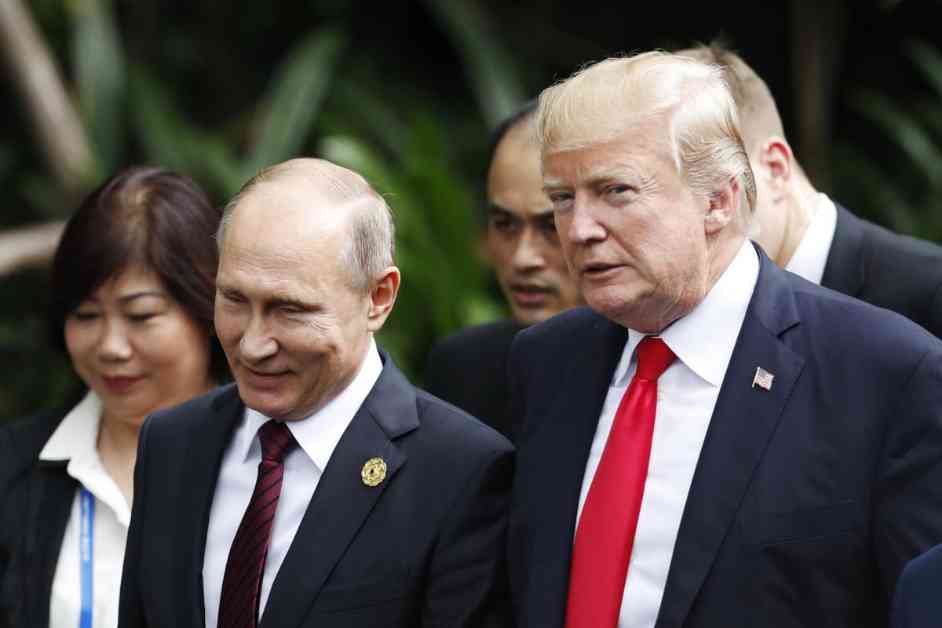Former National Security Adviser Accuses Trump of Fabricating Conversation with Putin
Former national security adviser to Donald Trump, John Bolton, has come forward with accusations that the former president fabricated a conversation with Russian President Vladimir Putin. The alleged conversation took place four years ago, where Trump claimed he warned Putin against invading Ukraine. Bolton, who served during Trump’s presidency, believes that this conversation was a product of Trump’s imagination, aimed at portraying himself as a strong leader.
Bolton’s Claims
In a recent interview, Bolton expressed his doubts about the validity of Trump’s claims regarding his conversation with Putin. He stated, “I think Trump’s making that up. He certainly didn’t have that conversation with Putin when I was in the White House. I don’t believe he had it before then.” Bolton, who has had firsthand experience in observing Trump’s interactions with world leaders, dismissed the former president’s narrative as fictional.
According to Bolton, Trump’s use of language during the alleged conversation, such as “no way” and “way,” resembled more of a casual exchange between teenagers rather than a serious diplomatic discussion between world leaders. Bolton emphasized that he had never witnessed or been aware of any such conversation taking place during his time in the White House.
Trump’s Narrative
During a conversation with Elon Musk, Trump reiterated his claims about warning Putin against invading Ukraine. He recounted, “I said to Vladimir Putin, ‘don’t do it. You can’t do it, Vladimir. You do it, it’s going to be a bad day.'” Trump further elaborated on the exchange, stating, “I told him things that I would do. And he said, ‘no way,’ and I said, ‘way.’ And, you know, it’s the last time we ever had the conversation. He would never have done. I got along well with him.”
Criticism of Trump’s Approach
Bolton’s skepticism about Trump’s alleged conversation with Putin highlights concerns about the former president’s approach to international relations. Bolton suggested that Putin may view Trump as an easy target for manipulation, given Trump’s tendency to respond positively to flattery. He emphasized that Trump’s lack of understanding of historical context and geopolitical dynamics could have serious implications for diplomatic efforts.
Potential Consequences
If Trump were to be re-elected and pursue a meeting with Putin and Ukrainian President Volodymyr Zelensky, Bolton warned of potential negative outcomes for Ukraine. He expressed his belief that Putin would take advantage of Trump’s lack of expertise in the region and negotiate to Ukraine’s detriment. Bolton’s assessment underscores the importance of having knowledgeable and experienced leadership in addressing complex international conflicts.
Trump’s Relationships with Authoritarian Leaders
In his conversation with Musk, Trump praised authoritarian leaders such as Putin, Chinese President Xi Jinping, and North Korean leader Kim Jong Un. He described them as being “at the top of their game” and claimed to have had positive interactions with Kim Jong Un. Trump’s admiration for strongman leaders raises questions about his values and priorities in foreign policy.
Critique of Trump’s Leadership
Bolton’s critique of Trump’s leadership style extends beyond his interactions with Putin and other authoritarian leaders. He raised concerns about Trump’s overall fitness for the presidency, citing his lack of historical knowledge and diplomatic expertise. Bolton’s assessment underscores the importance of having leaders who are well-informed and capable of navigating complex international relationships.
Conclusion
The allegations made by John Bolton regarding Trump’s fabricated conversation with Vladimir Putin shed light on the former president’s approach to diplomacy and international relations. Bolton’s insights provide valuable perspective on the challenges of navigating complex geopolitical dynamics and the importance of having knowledgeable and experienced leadership in addressing global conflicts. As the debate continues over Trump’s claims and his suitability for the presidency, it becomes increasingly clear that effective leadership in foreign policy requires a deep understanding of history, diplomacy, and strategic decision-making.












